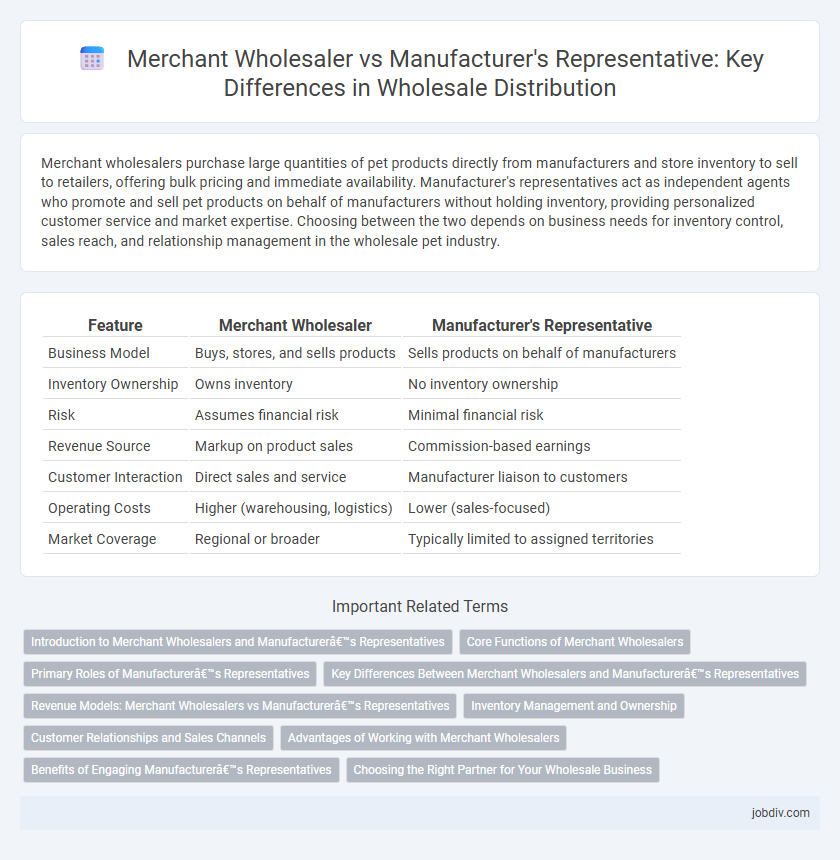Merchant wholesalers purchase large quantities of pet products directly from manufacturers and store inventory to sell to retailers, offering bulk pricing and immediate availability. Manufacturer's representatives act as independent agents who promote and sell pet products on behalf of manufacturers without holding inventory, providing personalized customer service and market expertise. Choosing between the two depends on business needs for inventory control, sales reach, and relationship management in the wholesale pet industry.
Table of Comparison
| Feature | Merchant Wholesaler | Manufacturer's Representative |
|---|---|---|
| Business Model | Buys, stores, and sells products | Sells products on behalf of manufacturers |
| Inventory Ownership | Owns inventory | No inventory ownership |
| Risk | Assumes financial risk | Minimal financial risk |
| Revenue Source | Markup on product sales | Commission-based earnings |
| Customer Interaction | Direct sales and service | Manufacturer liaison to customers |
| Operating Costs | Higher (warehousing, logistics) | Lower (sales-focused) |
| Market Coverage | Regional or broader | Typically limited to assigned territories |
Introduction to Merchant Wholesalers and Manufacturer’s Representatives
Merchant wholesalers purchase goods in large quantities directly from manufacturers and resell them to retailers or other businesses, handling inventory and logistics to streamline distribution. Manufacturer's representatives act as intermediaries, representing multiple manufacturers to sell products on their behalf without taking ownership of the inventory. Understanding the distinct roles of merchant wholesalers and manufacturer's representatives is essential for optimizing supply chain efficiency and expanding market reach in wholesale trade.
Core Functions of Merchant Wholesalers
Merchant wholesalers primarily handle bulk purchasing, storage, and distribution of goods to retailers or other businesses, managing inventory and logistics to ensure efficient product flow. They assume title to the goods, providing financial risk coverage and credit services to buyers, unlike manufacturer's representatives who act as intermediaries without owning inventory. Merchant wholesalers also offer market information, promotion, and sales support to customers, playing a key role in the supply chain by bridging manufacturers and retailers.
Primary Roles of Manufacturer’s Representatives
Manufacturer's representatives act as independent agents who promote and sell products on behalf of multiple manufacturers, focusing on building customer relationships and increasing market reach. Their primary roles include presenting product lines, negotiating sales contracts, and providing market feedback to manufacturers without holding inventory. Unlike merchant wholesalers, they do not take ownership of goods but facilitate transactions to expand distribution channels efficiently.
Key Differences Between Merchant Wholesalers and Manufacturer’s Representatives
Merchant wholesalers take ownership of the goods they distribute, maintaining inventory and assuming the risks associated with storage and transportation, whereas manufacturer's representatives act as independent agents who do not own the products but facilitate sales on behalf of manufacturers. Merchant wholesalers handle bulk purchasing, warehousing, and direct sales to retailers or other businesses, offering logistical support and credit terms, while manufacturer's representatives specialize in sales expertise, market knowledge, and relationship management without holding stock. The distinction impacts cost structures, operational control, and the nature of customer interactions within the supply chain.
Revenue Models: Merchant Wholesalers vs Manufacturer’s Representatives
Merchant wholesalers generate revenue primarily through inventory markups, purchasing goods in bulk and selling them at a profit to retailers or other businesses. Manufacturer's representatives earn income via commissions based on sales volume, acting as intermediaries without holding inventory. This fundamental difference affects cash flow, risk exposure, and profit margins, where wholesalers bear inventory risk while representatives benefit from lower overhead costs.
Inventory Management and Ownership
Merchant wholesalers maintain full ownership and control of inventory, enabling direct management of stock levels and order fulfillment, which optimizes supply chain efficiency. Manufacturer's representatives do not hold inventory; they act as intermediaries who facilitate sales between manufacturers and buyers without assuming inventory risks or ownership. This distinction impacts how businesses manage cash flow, storage costs, and responsiveness to market demand in wholesale operations.
Customer Relationships and Sales Channels
Merchant wholesalers maintain direct ownership of inventory and build long-term customer relationships by offering personalized service, credit, and bulk purchasing options. Manufacturer's representatives act as independent agents, representing multiple manufacturers to streamline sales channels without owning inventory, focusing on expanding market reach through specialized product knowledge. Both models leverage distinct sales strategies: merchant wholesalers provide immediate product availability, while manufacturer's representatives enhance brand presence across diverse customer bases.
Advantages of Working with Merchant Wholesalers
Merchant wholesalers offer direct inventory control and faster order fulfillment, ensuring businesses maintain consistent stock levels and meet customer demand efficiently. They provide bulk purchasing power, which reduces costs through volume discounts that manufacturers' representatives cannot guarantee. Their established logistics networks and warehousing capabilities simplify supply chain management, minimizing lead times and improving overall distribution reliability.
Benefits of Engaging Manufacturer’s Representatives
Engaging manufacturer's representatives enhances market reach by leveraging their established networks and deep industry knowledge, resulting in increased sales efficiency and reduced overhead costs. Their commission-based structure minimizes financial risk while providing personalized customer service that builds stronger client relationships. This approach streamlines product distribution and accelerates entry into new regions without the need for extensive internal sales teams.
Choosing the Right Partner for Your Wholesale Business
Selecting the ideal partner for your wholesale business hinges on understanding the distinct roles of merchant wholesalers and manufacturer's representatives. Merchant wholesalers purchase and warehouse goods, taking title to inventory and offering direct control over product distribution, which benefits businesses seeking consistent stock availability. Manufacturer's representatives act as independent agents who promote products without holding inventory, providing cost-effective market expansion and specialized sales expertise.
Merchant Wholesaler vs Manufacturer’s Representative Infographic

 jobdiv.com
jobdiv.com